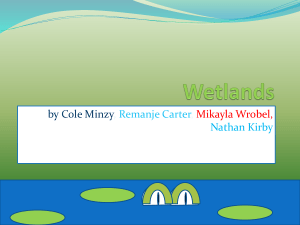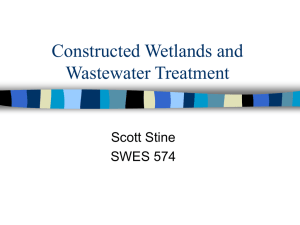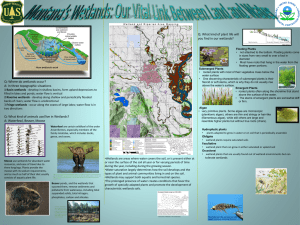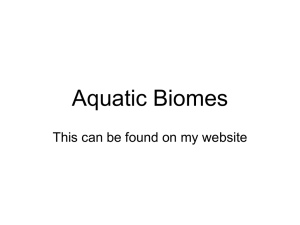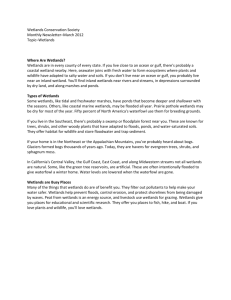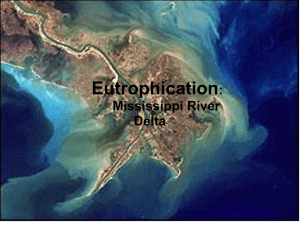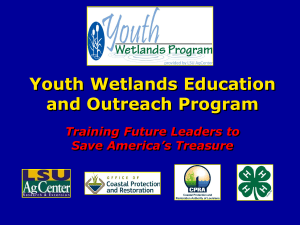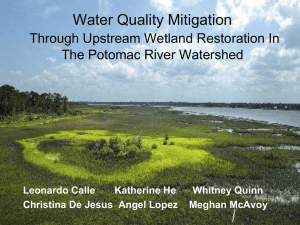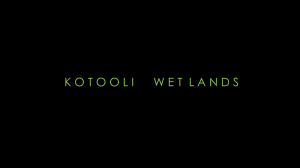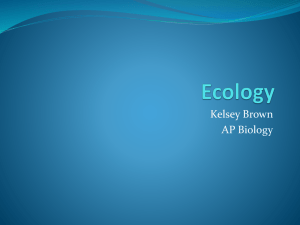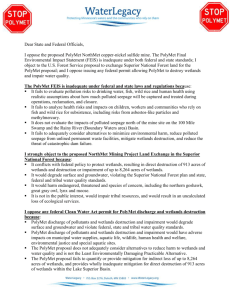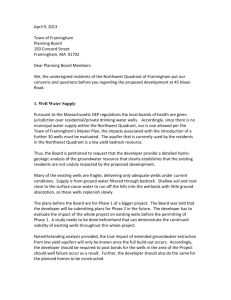Protecting the Wetlands
advertisement
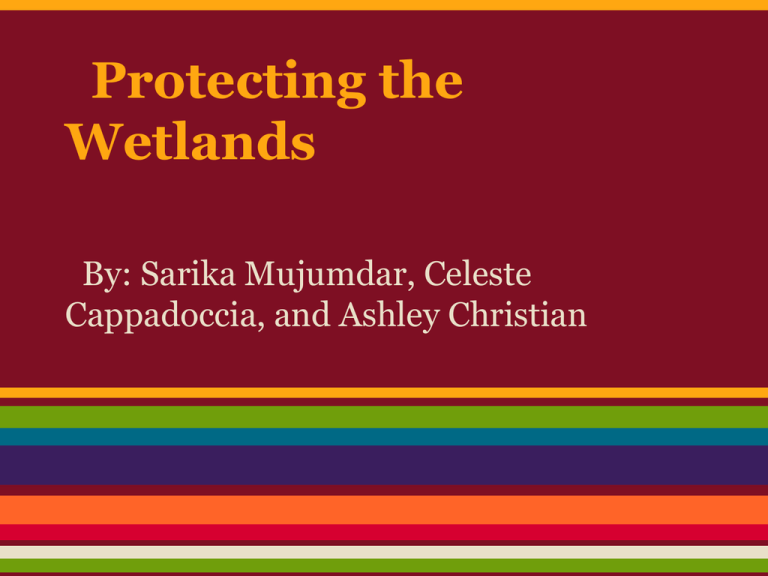
Protecting the Wetlands By: Sarika Mujumdar, Celeste Cappadoccia, and Ashley Christian WHAT ARE WETLANDS? • Swamps • Marshes • Peatlands THE PROBLEM! • Wetlands are being drained and filled in • • for agricultural and recreational businesses This destroys the organisms that live there, such as trees, fish, birds, etc. Invasive species also start to take over wetlands, negatively affecting the biodiversity WHY ARE WETLANDS IMPORTANT? • Natural filters for water pollution • Flooding gets reduced by vegetation • Provide a habitat for various species • Support fish and birds • Provide different building materials for humans HOW ARE HUMANS CAUSING IT? • Drainage • • • • • • • Dredging and stream channelization Deposition of fill material Diking and damming Tilling for crop production Levees Logging Mining • • • • • • • Construction Run- off Air and water pollution Changing nutrient levels Release of toxic chemicals Introduction of invasive species Grazing by domestic animals POSSIBLE OUTCOMES • Invasive species out compete native • • • animals for food and habitats Causes an increase in the invasive species Causes the native animals to suffer Destroyed organisms can ruin the equilibrium of a habitat ENVIRONMENTAL IMPACT • Erosion/Water • • • • Displacement Subsidence Sea level rise Droughts Hurricanes and other large IMPACT OF EROSION • Erosion is the gradual destruction of land by water, rocks, wind, etc. • Messes up the organization of • wetlands by destroying trees and animals Water displacement IMPACT OF NATURAL DISASTERS • Hurricanes can kill organisms and cause floods • Droughts kill the organisms because no water is present • Rising of the sea level can cause floods • Subsidence causes the wetland to sink, destroying all of its inhabitants OTHER HUMAN INTERFERENCES • Humans cut down a lot of trees in the wetlands • Water Pollution- Humans use water • transportation (boats, ships) through the wetlands, killing organisms Fishing in the wetlands disturbs the food chain, so organisms become more vulnerable BUT WE CAN STILL HELP! • Check out the wetlands around you • Sign up/raise money for a non-profit organization • Spread the word about protecting wetlands • Cut down less trees IMPACT ON THE BIOGEOCHEMICAL CYCLES • There will be less carbon so no plants will grow • • • and there would be problems with photosynthesis Nitrogen would not be affected Phosphorus would not be affected Animals wouldn't have enough safe water, since much of the water would be displaced, causing floods in some places and droughts in others Animals of the Wetlands THE DESTRUCTION KILLS THE ANIMALS!!! :( THANK YOU! :) (CITATIONS) "Wetlands." LEARNING CENTER. N.p., n.d. Web. 31 May 2013. "Human Impact of Wetland Ecosystems." Human Impact of Wetland Ecosystems. N.p., n.d. Web. 31 May 2013. "Causes and Impacts of Invasive Alien Species." Causes and Impacts of Invasive Alien Species. N.p., n.d. Web. 31 May 2013. "WETLANDS AND THE EIA PROCESS." The Environmental Impact Assessment Toolkit. N.p., n.d. Web. 31 May 2013. "Human Impacts and Management of Wetlands." Human Impacts and Management of Wetlands. N.p., n.d. Web. 31 May 2013. Pictures: http://3.bp.blogspot.com/Y87cEA6dmMQ/UDRreXgDIaI/AAAAAAAAAa0/IVDlZodQyoA/s1600/Beaver+Animal.jpg http://c1planetsavecom.wpengine.netdna-cdn.com/files/2010/09/3520794450_9e42dc72bb.jpg http://wildlovephotography.com/blog/wp-content/uploads/2010/07/Mink_WakarusaWetlands.jpg http://s3.favim.com/orig/46/colorful-cute-deer-eyes-glossy-Favim.com-417378.jpg http://www.toddicus.com/dead%20beaver.JPG http://www.cartinafinland.fi/en/imagebank/image/17/17874/dead+muskrat+17874.jpg http://s0.geograph.org.uk/geophotos/02/44/70/2447074_db14d00d.jpg http://www.dismuse.com/wp-content/uploads/2011/01/dead_deer.jpg
